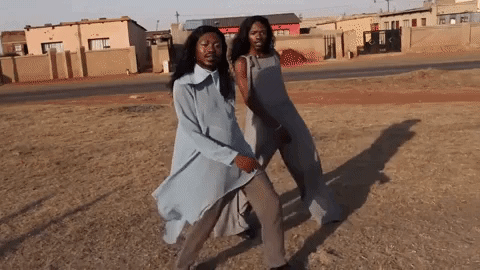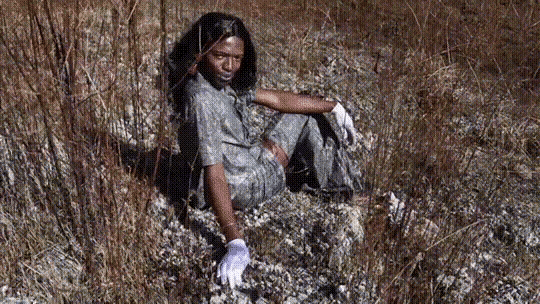FAKA experiments with new gqom sound to take audiences on a nostalgic journey
By Tiger Maremela
You would not be reaching if you claimed FAKA as post-apartheid South African icons. FAKA, a performing arts duo comprised of Desire Marea and Fela Gucci, have consistently provided us with a visual vocabulary to navigate the queer experiences often ignored by mainstream media.
The duo recently released the official music video for the new track, ‘Uyang’khumbula‘. The track is a nostalgic journey through teenage romance, the policing of bodies, and speaking against heteronormativity. After playing the video on loop for hours, I reached out to FAKA to chat about producing the song, the creative direction of the video, and South Africa’s gqom scene.
The track ‘Uyang’khumbula’ is a lot more bass- and drum-heavy than the work on your EP, Bottom’s Revenge. Your take on ancestral lamentations and experimentation is still in use, with an uptempo dick-riding revival fit for a Friday night vigil. What inspired the direction for the song?
We love Gqom, and we relate to the realities that have influenced it as a genre. We felt we wanted to experiment with it in its pure form this time around, whereas previously it was always an eclectic mash-up of all our Gospel and Gqom influences hence the phrase “Ancestral Gqom-Gospel”. The spiritual element is always a constant in our sonic aesthetic and it fits in well with Gqom, because ultimately we believe Gqom to be modern African spiritual music.
You worked with Vukani Chamane and Mnotho Chamane who produced the track. How was the collaboration process?
It was amazing. We got in touch with DJ Bigger who connected us to the talented Vukani and Mnotho who then created two beats for us. There was something special about this beat, and we wrote for it and recorded right away. It really was a seamless process, even though we didn’t actually physically meet them. We will be working with them again very soon.

TM: The official video serves Queen and Karabo Moroka realness, an opulent aesthetic that is evident in all of your work. With the both of you having very distinct looks, how did you go about styling the music video?
FAKA: Our biggest reference in relation to aesthetics has always been black opulence. We were both raised by our grandmothers who adorned their houses and wardrobes in organza, mink blankets and church regalia. We always try to recreate this nostalgia in our visuals with an extra cuntyness inspired by our aunts who emulated Brenda Fassie, Lebo Mathosa and Thembi Seete. Nao Serati’s garments seemed perfect for this. We chose pieces that we thought resonated with us and would create an interesting visual against the backdrop of the locations we had decided on.

Your choice of locations is an interesting one: expansive velds and pathways with barbed wire fences in the background. This seems to be in a conversation with how you utilise a videographic style that is elegantly kitsch, visually accessible and recorded with a resolution the post-Mxit era can resonate with. Is there anything in particular that informed your choice of location and videography?
We wanted to try something different but also something that resonated with the context of gqom and it being a movement that comes from ekasi, we thought it necessary for us to celebrate it there too and bring our art into that space, instead of it only existing in spaces of privilege. This was a way of us reclaiming our queerness and femmehood in the spaces that we come from where we often felt like we had to police ourselves. This is an ode to all the queer and femme bodies that have to navigate violence ekasi, an ode to those we’ve lost to hate crimes. This was a voetsek to all the model c’ness that erases disenfranchised black queer bodies.
In relation to videography, we had access to a camera and no other equipment that perhaps is used to make big budget videos. We liked the footage as it is and how it reflects our experience as people who utilize the little resources we have aka 3RD WORLD AESTHETICS.
@FelaGucci has tweeted a lot about the exclusion and erasure of queer and femme DJs in the South African music landscape. How are you two navigating the journey of queering gqom music?
With the impact gqom has garnered across the globe and the commodification of it by white cis men. Queer and femme bodies have been erased from the movement. We hope to disrupt this narrative by being visible as who we are. In the lyrics of ‘Uyang’khumbula’ we talk about our childhood encounters of romance with boys who later in life learned to suppress their desire for us because they feared existing outside of heteronormativity.
Writer’s Bio: Tiger Maremela is a millennial hyphenate trying to make sense of the world by endlessly scrolling through the internet. You can subscribe to their (sometimes) weekly newsletter, internet treatz, here.





